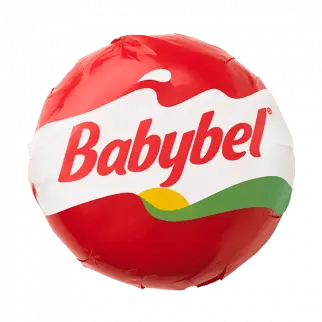
As dog owners, we all want our beloved pets to have a taste of the things we enjoy. But when it comes to Babybel cheese, it’s important to know if it’s safe for dogs to have a bite. While dogs can have a little bit of cheese as an occasional treat, it’s essential to understand the potential risks and benefits before sharing this delicious snack with your furry companion. So, can dogs eat Babybel cheese, or is it potentially harmful to their health? In this article, we will explore the topic and provide you with a comprehensive guide to ensure safe and enjoyable snacking for your furry friend. Let’s unravel the truth about whether dogs can indeed eat Babybel cheese and what precautions you should take.
What Is Babybel Cheese?
Babybel cheese is a popular brand of cheese that originated in France and is now enjoyed worldwide. It is known for its distinctive round shape and individual wax coatings, which help preserve the cheese and make it convenient for snacking. Babybel cheese is typically made from cow’s milk and has a semi-hard texture. It comes in various flavors, including original, light, and different varieties with added ingredients like herbs or spices. The cheese is creamy, mild in flavor, and often enjoyed as a quick, portable snack. Each piece of Babybel cheese is individually wrapped in wax, which acts as a protective coating. This wax can be peeled away before consuming the cheese. The wax coating helps maintain the cheese’s freshness and extends its shelf life. Babybel cheese is often enjoyed by both children and adults as a snack or part of a packed lunch.
Can Dogs Eat Babybel Cheese?

While dogs can eat small amounts of Babybel cheese, there are a few important factors to consider. Babybel cheese is a semi-hard cheese with a red wax coating that adds to its visual appeal. It is a pasteurized milk product and has a tangy flavor.
Feeding Babybel cheese to your dog can be beneficial if they do not have severe lactose intolerance. The lactose content in Babybel cheese is relatively low, making it easier for most dogs to digest. However, dogs with lactose intolerance may experience digestive issues if they consume Babybel cheese.
It is generally safe to give your dog a tiny piece of Babybel cheese as an occasional treat, once or twice a week. However, it is important to monitor their response and ensure they do not consume a significant amount. Feeding large quantities of cheese, including Babybel, can lead to digestive upset, including an upset stomach or diarrhea.
If your dog accidentally eats a small amount of Babybel cheese, there is usually no need to worry. It is unlikely to cause blockages or choking, and it is considered non-toxic. However, it is always best to consult with your veterinarian if you have any concerns or if your dog experiences any adverse reactions after consuming Babybel cheese.
Remember, moderation is key when it comes to sharing any human food with your dog. Each dog’s dietary needs and sensitivities can vary, so it’s important to consider their individual health and consult with a veterinarian for personalized advice.
Related Post: Can Dogs Eat Cheerios? Safe or Risky Snacking?
The Benefits of Babybel Cheese for Dogs: A Tasty Treat Worth Considering
While Babybel Cheese can be enjoyed by humans, it is important to note that it is not specifically formulated or recommended as a regular part of a dog’s diet. Dogs have different nutritional needs than humans, and their digestive systems may not be able to process certain ingredients or handle high levels of fat and sodium.
That being said, in small amounts and as an occasional treat, Babybel Cheese can offer a few potential benefits for dogs:
- Protein: Babybel Cheese contains 4g of protein per serving. Protein is essential for building and repairing tissues, supporting the immune system, and maintaining healthy skin and coat in dogs. However, it’s important to remember that dogs primarily need protein from animal sources, such as meat and fish, which provide a complete amino acid profile.
- Calcium: Babybel Cheese is a source of calcium, with 140mg per serving. Calcium is important for bone health and muscle function in dogs. However, it’s worth noting that dogs have different calcium requirements than humans, and their diets should ideally consist of a balanced blend of calcium-rich foods specifically formulated for their needs.
It’s crucial to exercise caution when feeding cheese or any other human food to dogs. Some dogs may have lactose intolerance or dairy allergies, which can lead to digestive upset. Additionally, cheese is generally high in fat and sodium, which can be problematic for dogs, particularly those with certain health conditions like pancreatitis or heart disease. The high calorie content of cheese can also contribute to weight gain and obesity in dogs.
If you want to provide your dog with occasional treats or snacks, it’s best to opt for dog-specific treats that are formulated with their nutritional needs in mind. These treats are designed to be safe and beneficial for dogs while providing appropriate levels of protein, vitamins, and minerals.
Always consult with your veterinarian before introducing any new food to your dog’s diet, including treats or human foods. They can offer guidance based on your dog’s specific needs, health status, and dietary requirements.
Related Post: Can Dogs Eat Orange Chicken?
Potential Risks of Feeding Babybel Cheese to Dogs
While Babybel Cheese may seem tempting to share with your furry friend, it’s essential to understand the potential risks associated with feeding it to dogs. Here are a few important considerations:
- High Fat Content: Babybel Cheese contains 5g of total fat, with 3.5g being saturated fat, in just one serving. Dogs have different fat requirements than humans, and excessive fat consumption can lead to weight gain, obesity, and digestive issues such as pancreatitis. High-fat foods like cheese should be limited in a dog’s diet.
- Sodium Concerns: With 150mg of sodium per serving, Babybel Cheese contains a notable amount of salt. Dogs are generally more sensitive to sodium than humans, and excessive salt intake can contribute to dehydration, electrolyte imbalances, and increased blood pressure. Dogs with certain health conditions, such as heart disease or kidney problems, should avoid high-sodium foods like cheese altogether.
- Digestive Upset: Dairy products like cheese may pose a risk for dogs with lactose intolerance or dairy allergies. Dogs lack the necessary enzymes to effectively break down lactose, the sugar present in milk, which can lead to digestive discomfort, including diarrhea, gas, and bloating. It’s best to err on the side of caution and avoid feeding cheese to dogs prone to lactose intolerance or dairy allergies.
- Nutritional Imbalance: Although Babybel Cheese provides some protein and calcium, it’s important to note that dogs have specific dietary requirements that are best met through balanced dog food. Relying on cheese as a primary source of nutrients can result in an imbalanced diet lacking in other essential nutrients.
To ensure your dog’s well-being, it is recommended to consult with a veterinarian regarding suitable treats and snacks. They can provide guidance on appropriate dog-specific options that meet your pet’s nutritional needs and minimize potential risks associated with human foods.
Remember, a balanced and species-appropriate diet, along with suitable dog treats, is crucial for your dog’s overall health.
Related Post: Can Dogs Eat Tuna?
Can Dogs Eat Cheese?
Yes, dogs can eat cheese, but it should be given in moderation and with caution. While cheese can be a tasty treat for dogs, there are a few important considerations to keep in mind:
- Lactose Intolerance: Many dogs have difficulty digesting lactose, the sugar found in milk and dairy products. This can lead to digestive upset, including diarrhea and gas. If your dog shows signs of lactose intolerance, it’s best to avoid feeding them cheese or opt for lactose-free alternatives.
- High Fat and Sodium Content: Cheese is generally high in fat and sodium, which can be problematic for dogs, particularly those with certain health conditions like pancreatitis or heart disease. Excessive consumption of high-fat foods can lead to weight gain, digestive issues, and other health problems. It’s crucial to offer cheese in small portions as an occasional treat.
- Individual Sensitivities and Allergies: Just like humans, dogs can have individual sensitivities or allergies to certain types of cheese or specific ingredients within them. If you notice any signs of allergic reactions, such as itching, vomiting, or diarrhea after giving your dog cheese, discontinue its consumption and consult with a veterinarian.
- Choose Low-Fat Options: If you decide to give your dog cheese, opt for low-fat varieties and offer it as an occasional treat rather than a regular part of their diet. Cottage cheese or mozzarella can be better options due to their lower fat content.
- Consult with a Veterinarian: It’s always recommended to consult with your veterinarian before introducing any new food to your dog’s diet, including cheese. They can provide specific guidance based on your dog’s breed, age, size, overall health, and dietary requirements.
Remember, cheese should never replace a nutritionally balanced dog food diet. While occasional small amounts of cheese can be enjoyed by some dogs, it’s crucial to prioritize their overall nutritional needs and choose appropriate dog-specific treats for their well-being.
Related Post: Can Dogs Eat Acai? Exploring the Safety and Benefits
Can Cheese Upset A Dog’s Stomach?
Yes, cheese can upset a dog’s stomach. Some dogs may have difficulty digesting lactose found in cheese, leading to digestive issues like diarrhea and gas. Additionally, the high fat content of cheese can cause pancreatitis in dogs, resulting in vomiting and abdominal pain. It’s important to monitor your dog’s reaction to cheese and consider their individual sensitivities and dietary needs before offering it as a treat.
Related Post: Can Dogs Eat Couscous? How Much Is Safe?
Know Your Cheese: Types to Avoid When Feeding Your Dog
When it comes to feeding cheese to your dog, certain types should be avoided. Here are a few types of cheese that are generally not recommended for dogs:
- Blue Cheese: Blue cheese contains a mold called Roquefortine C, which can be toxic to dogs if consumed in large amounts. It can cause symptoms like vomiting, diarrhea, and tremors.
- Cheese with Additives: Cheeses that contain additives like herbs, spices, or seasonings may not be suitable for dogs. Some additives can be harmful or cause digestive upset in dogs.
- Soft and Mold-Ripened Cheeses: Soft cheeses like Brie, Camembert, or other mold-ripened varieties have a higher risk of containing harmful bacteria, such as Listeria or Salmonella. These bacteria can cause serious illness in dogs.
- Cheese with High Sodium or Fat Content: Cheeses with high sodium or fat content, such as certain processed or aged cheeses, should be avoided. Excessive sodium can lead to dehydration and electrolyte imbalances, while high-fat content can cause digestive issues and weight gain.
It’s important to remember that every dog is unique, and some may have specific sensitivities or allergies to certain types of cheese. Always consult with your veterinarian before introducing any new food to your dog’s diet to ensure their safety and well-being.
Related Post: Can Dogs Eat Durian Safely?
Conclusion
While Babybel Cheese may be a delightful snack for humans, it is important to approach it with caution when considering it for dogs. While it offers some potential benefits like protein and calcium, it also comes with risks such as high fat and sodium content, lactose intolerance concerns, and the potential for nutritional imbalances. As responsible pet owners, we must prioritize our dogs’ specific dietary needs and consult with veterinarians to ensure their overall health and well-being. While an occasional, small piece of Babybel Cheese may be enjoyed by some dogs without adverse effects, it is crucial to remember that a balanced and appropriate canine diet remains paramount for their optimal health.




